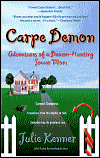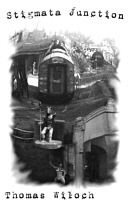Dead Things, by Stephen Blackmoore
Book Review by Joshua Palmatier
Have you read this book?
This is Stephen Blackmoore's second novel and it's unrelated to his first, City of the Lost,
at least in terms of sequels or series. There are a few tenuous
connections--such as the mysterious bar with multiple hard-to-find
entrances, etc--but it's really a stand-alone novel. So if you've
never read Stephen Blackmoore, feel free to pick this one up and start
here.
The basic premise is that Eric Carter is a necromancer, someone who can see, talk to, and manipulate the dead. It's a power he was born with and after a sorcerer killed his parents, he fled Los Angeles and used his powers to make a living . . . so to speak . . . abandoning his sister in the process. Now, fifteen years later, he learns that someone has brutally murdered his sister, so he returns to L.A. to find her killer . . . and perhaps to take responsibility for the numerous mistakes he's made in his life, including running away in the first place. But of course, he stumbles into something much larger than his sister's death, and he may just be forced to deal with the responsibility of his own powers in the process.
I thought this was a good book. I'll repeat that I'm not a huge fan of urban fantasy, so take that into account with this review. Stephen Blackmoore does some really cool stuff in this book. His idea of what necromancy is, and the ways in which his character uses those powers, has been taken to a whole new level here. It's dark and gritty and definitely not nice, which is the way necromancy should be. But his main character--while rough and tough and deadly--also has a "good" side. You can see his humanity and you can see his struggle dealing with his own power. He's been traumatized and burned by his power often, but he's still fighting to remain "normal" in some sense. So the world set-up and the characters in the book are great.
However, I thought the plotline wasn't as strong as it needed to be. It didn't quite hang together as strongly as it could have and there were a few "loose ends" that I didn't quite believe. In essence, Eric Carter came across as smarter than he behaved at certain points. I thought some of the clues about what was really going on were rather obvious and Eric should have picked up on them much, much earlier. If he had, it would have forced the plotline to become more complicated (unless the book was going to end rather abruptly and be a novella instead). And that's what was missing. The "complications" in the plot felt a little forced, brought on by the inability of the main character to see what was happening, and this made the plot feel weak and loose to me. If more time had been spent on the plot, if it had been developed more, the book would have been much, much stronger. The world and characters could certainly have supported it.
So, a good book, but not as strong as Stephen's first book. Certainly entertaining, but I thought it could have supported a much stronger, more complicated plot.
Joshua Palmatier/Benjamin Tatewhen your husband cheats
The basic premise is that Eric Carter is a necromancer, someone who can see, talk to, and manipulate the dead. It's a power he was born with and after a sorcerer killed his parents, he fled Los Angeles and used his powers to make a living . . . so to speak . . . abandoning his sister in the process. Now, fifteen years later, he learns that someone has brutally murdered his sister, so he returns to L.A. to find her killer . . . and perhaps to take responsibility for the numerous mistakes he's made in his life, including running away in the first place. But of course, he stumbles into something much larger than his sister's death, and he may just be forced to deal with the responsibility of his own powers in the process.
I thought this was a good book. I'll repeat that I'm not a huge fan of urban fantasy, so take that into account with this review. Stephen Blackmoore does some really cool stuff in this book. His idea of what necromancy is, and the ways in which his character uses those powers, has been taken to a whole new level here. It's dark and gritty and definitely not nice, which is the way necromancy should be. But his main character--while rough and tough and deadly--also has a "good" side. You can see his humanity and you can see his struggle dealing with his own power. He's been traumatized and burned by his power often, but he's still fighting to remain "normal" in some sense. So the world set-up and the characters in the book are great.
However, I thought the plotline wasn't as strong as it needed to be. It didn't quite hang together as strongly as it could have and there were a few "loose ends" that I didn't quite believe. In essence, Eric Carter came across as smarter than he behaved at certain points. I thought some of the clues about what was really going on were rather obvious and Eric should have picked up on them much, much earlier. If he had, it would have forced the plotline to become more complicated (unless the book was going to end rather abruptly and be a novella instead). And that's what was missing. The "complications" in the plot felt a little forced, brought on by the inability of the main character to see what was happening, and this made the plot feel weak and loose to me. If more time had been spent on the plot, if it had been developed more, the book would have been much, much stronger. The world and characters could certainly have supported it.
So, a good book, but not as strong as Stephen's first book. Certainly entertaining, but I thought it could have supported a much stronger, more complicated plot.
Joshua Palmatier/Benjamin Tatewhen your husband cheats
|
Click here to buy Dead Things, by Stephen Blackmoore on Amazon
|
Dead Things, by Stephen Blackmoore on Amazon
| More Books You Might Like |
Comment on Dead Things, by Stephen Blackmoore
| Comments on Dead Things, by Stephen Blackmoore |
| There are no comments on this book. |



